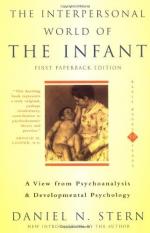
|
| Name: _________________________ | Period: ___________________ |
This test consists of 5 short answer questions, 10 short essay questions, and 1 (of 3) essay topics.
Short Answer Questions
1. The sense of a core self is built out of patterns of __________ which maintain themselves in an equilibrium that becomes a sense of self.
2. Self psychology, according to Stern, offers the most ________ value when it suggests search strategies that help construct life narratives.
3. Children between fifteen and eighteen months can also begin to perform deferred _____ where they repeat behaviors observed and thus they can acquire new skills.
4. __________ intensity, according to Stern, may not be the decisive influence that many have thought it to be.
5. At the same time, language can also create a split in the experience of the ______ because it can only partially represent other senses of self.
Short Essay Questions
1. At what age do mothers add a new dimension of affect attunement when they are with their infants?
2. What does the development of the infant infer, according to Stern's findings?
3. What does Freud believe about the first few months of an infant's life, according to the book?
4. What are the stages of development that Stern recommends foregoing in terms of analysis?
5. What does the quasi-imitation that happens between an infant and their mother produce?
6. What might result in anxiety disorders later in life, according to Stern's studies in this book?
7. What sense is most sensitive during its formation, according to Stern in this book?
8. As what does Stern hope for his work to serve within psychology and in the world, according to the content of the book?
9. Why might pathologies result in the study of the formation of self in the infant, according to Stern?
10. Why should the period of emergence of each sense of self be focused on when an infant is studied, according to the content of the book?
Essay Topics
Write an essay for ONE of the following topics:
Essay Topic 1
Stern seems to be using the study of infants to help readers learn more about human nature in general.
Part 1: Do infants seem to be a good way to study human nature?
Part 2: Why is the study of human nature important to the audience?
Part 3: How might human behavior change after learning more about infants?
Essay Topic 2
Infants seem to be emotionally responsive to those around them, changing their moods based on how they feel others are acting.
Part 1: Do you agree that infants react to those around them?
Part 2: How do you think a parent should change their behavior if their infant reacts to the way they act?
Part 3: Why do you think infants might be programmed to respond to others around them?
Essay Topic 3
Observing infants cannot be an easy process, since they cannot communicate feelings.
Part 1: How do you think a person can become adept at observing infants?
Part 2: Do you think that infants are able to communicate, even if it's nonverbal?
Part 3: How might you begin to observe the behaviors of infants if you were studying them?
|
This section contains 678 words (approx. 3 pages at 300 words per page) |

|




